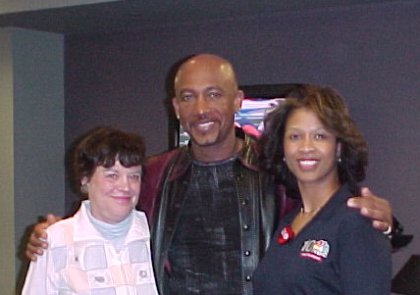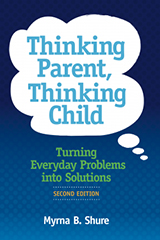Tip for Parents
Please click on the article that you would like to view.
Tips for Parents of Young Children
Do
our kids always understand what we say?
My child is tattling again
That's not fair and other whines
Did I promise that?
Tips for Parents of Preteens
A new way to
read: let Harry help
Oh, those bad, bad video
games
On Thoughtlessness
Your child is
using those bad words
Your child's friends are of concern
Help kids become problem-solvers
Help kids express feelings
Handling the boy problem
A niche for every kid
Preparing for the new school year
Who does the homework?
Dad's key to learning success
The unpopular child
Peer pressures at school
Did I promise that?
Click here for Myrna's parenting tips which aired on
The Big Talker 1210 AM Radio

Myrna Shure (left) with Montel Williams, TV syndicated talk-show Host, and Eva Blackwell, Publicist, NBC10, Philadelphia. Photograph taken at the NBC10 Fit Fest, an annual full day free event to learn more about health and fitness, with fun-filled activities for the whole family to enjoy -- held April 12th and 13th, 2003 at the Philadelphia Convention Center.

Myrna Shure interviewing Montel Williams at the NBC 10 Fit Fest, April 12th and l3th, Philadelphia, 2003.
Click here to read Myrna's column, "TV Host Montel Williams Explains MS to his Kids", as it was posted in the Philadelphia Daily News.
Is your child one of the millions mesmerized by the adventures of Harry? What is it about Harry Potter that so enraptures them? In asking children ages 7 to l2, I discovered it is different things to different kids.
A 7-year-old boy just likes the adventure, the magic, and wishes he could do what Harry does - well, some of what Harry does. An 11-year-old girl wanted to talk to her mom about Harry’s being an orphan, about his mean aunt and uncle, and since mom had read the story too, they were able to talk about their own family and how lucky they are to have the family they do.
Harry provides kids with lots of wonderful opportunities to think about their own lives at home and at school. And if you can read the books yourself, you can help your child connect Harry’s life to your child’s.
Here’s some things you can ask:
“Why do you think a girl in Harry’s school acts so bossy?” Now stretch your child’s thinking. Ask, “Why else?” Then ask, “Do you know a kid who acts that way in your school?” “Why do you think that kid needs to act that way?” “Why else?” “What can you think of to do or say so she won’t act that way?”
Harry’s adventures can help your child to think about how to solve other problems he may face in life. From an earlier book in the series, one 11-year-old girl was fascinated by how Harry flew his magic car too fast and crashed into a tree. It was fun to read how the tree came to life and fought back, but here was an opportunity to think about how Harry felt about what happened, what he did, and what else he could have done. This girl thought for a moment, and said, “I would have written a letter and have the owl who carries letters to school deliver the letter."
Reading the Harry Potter books is fun. What a wonderful way to excite your children to think about how they feel about things, how other people feel, and what they can do to solve the everyday problems in their own lives too.
Are you concerned that video games designed to knock down, shoot, or blow up human figures will make your child want to hurt other people? Do you prohibit these games to protect your child from thinking bad thoughts? Have you talked with your child to find out how he thinks about this?
One 10-year-old told me, “They’re just fiction. It’s fun. It’s cool. And I can help my hand-eye coordination. That makes me feel good.” When I asked him if he thought they might encourage him to hurt anyone in real life, he said, “I would never hurt anyone in real life. I could get in trouble, and I would lose my friends. You can’t lose friends in a video game.”
The other boy, also age 10, agreed. “They’re not real. They’re just fun.” When I asked if he thought those games could make kids violent, this boy confidently assured me that they could not, because “Once you beat the game, that’s the end, there’s no more to do. It’s no big deal.” He did tell me why he thought a classmate, already a bully who had no friends likes these games. “They probably make him feel better. He’s in control. In real life he’s not.”
That’s just one of the problems parents are concerned about, control. Control of who gets hurt, how much, and for how long. No big deal? They don’t agree.
Instead of risking making violent video games more attractive by prohibiting them, try helping your child think more about this for himself. You can ask, “How do you feel when someone gets hurt in real life?” “How do you think he feels.” “If you feel angry in real life, what can you do so you won’t hurt anyone?”
You can try to keep your child away from these kinds of video games if you’re concerned about potential violence, now, or later. Helping him learn empathy early in life will much more likely prevent it.
Does your child invite a friend to the house and then not come home on time?
Does he call a friend very early on Sunday morning, without thinking he might wake him up?
Does she borrow a book and not return it when her friend needs it to do her homework?
You’ve told your child a thousand times to think of others, but he doesn’t seem to hear you.
Here’s some things you can do:
- Ask your child how his friend might feel if no one’s home when he comes, gets awakened by the phone, or doesn’t have his book on time.
- Ask him what he thinks might happen if he doesn’t think of others, and then ask him if he wants those things to happen.
- Ask your child what he can do or say next time he has a chance to show a friend he cares.
- As early as preschool, children can care, and show they care about others.
And your children will act more thoughtfully if you help them think about how what they do affects others in return.
Your child is starting to use words you never heard him use before - curse words. Where did he hear them? Why is he starting to use them now?
You tell him to stop - but he doesn’t. You send him to his room - and he slams the door. You explain to him that he won’t have any friends if he talks to them like that - but he doesn’t hear a word you say. And when you ask him why he started to talk like that, he just says, “Because.”
You’re at your wits end. What can you do?
- First, think about whether something else is upsetting him now. Cursing can be the result of the real problem, not the problem itself.
- If you think he’s just being defiant, ask:
“How do you think I feel when you talk like that?”
“Can you think of a different way to tell me (or your friends) how you feel?”
Darren, age 8 came home from school one day using curse words he never used before. The more his mom demanded he stop, or explained why he shouldn’t use them, the more Darren defied her.
When she asked him to think of a different way to tell her how he felt, Darren stopped - smiled - and no more needed to be said.
Your 12-year-old is starting to mix with “friends” you think are bad for her - and you’re worried. You keep telling her you don’t want her hanging around those kids anymore - but that only makes them more attractive to her. You explain why she should find new friends - but she doesn’t hear you.
What can you do? What can you say?
If your child is caught up in what you think may be a destructive relationship, ask:
“How do you feel when you’re around those kids?”
“What is it about them that you like?”
“Do you like the way you feel around them?”
“What can happen if you stay friends with those kids?”
“Do you want that to happen?”
“What can you do so that will not happen?”
“How will you feel then?”
Most kids really do want to talk with their parents about issues like these. Mary Ann, age l2 never thought about these things before her dad asked her these questions. And she came to realize that her “friends” were getting her to do things she really didn’t want to do - and that maybe these were friends she didn’t really want to have. With this kind of help, Mary Ann will be better prepared to resist later pressure from peers as she approaches those more tumultuous teen age years.
Your 5-year-old is upset again because his sister keeps taking his toys.
You tell him you'll talk to her about it.Your 10-year-old complains that her sister keeps "borrowing" her jewelry.
You assure her you'll take care of this right away.Your 15-year-old is angry because his brother took his bike again - without his permission.
And you say, "I'll tell him you don't like that."Mom or dad to the rescue. But parents aren't always around to help their children when they need them.
Children have to learn to think for themselves.
Here are some things you can do:
- Bring your children together. Ask them to tell you what the problem is, and what they can do to solve it.
- Ask them to think about whether their solution is or is not a good one, and why. If they decide it's not a good idea, ask them to think of an idea they can both be happy with.
Rescuing children from the daily turmoil of life without involving them doesn't help them learn to solve their problems. It only relieves them from having to think any more about them. And as early as age 4, children can turn problems into problems that can be solved.
How do you feel when something you want to happen, doesn't?
How do you feel when something you thought would happen, didn't?
Do you take it out on others, give up, or find a way to make it OK?
We all have frustrations and disappointments in life.
And children do too.
Here's how we can help.
Let them express their feelings about it so they don't bottle them up.
Help them think of something different to do that they can feel good about.
Help them appreciate what they do have, instead of what they do not.
A 10-year old who was really disappointed that her parents couldn't come to her first soccer game told me, "I look on the bright side, I'm lucky, some kids don't get to do this at all."
Help your children turn a negative into a positive and they'll turn frustration into pride.
Your daughter's now 12 and starting to talk to boys. And you're concerned because she's talking to one particular boy - a lot - on the phone. He's two years older - and you don't know him.
If you restrict her entirely, she'll talk to him on the sly.
If you give her free rein, you worry about what they're saying - and where it might lead.
Here's some things you can do:
Let your daughter know you care how she thinks and feels about the boy. By doing this, you'll learn more about him than by asking her more direct questions.
Encourage your daughter to have a small group of friends over to your home, giving you a chance to meet him without his being singled out.
If you do decide your daughter is not yet ready to relate to this boy, ask her to think about why you may feel the way you do.
Simple forbidding her to talk to or see him will only make him seem all the more attractive.
If your preteen daughter can feel safe talking with your about these matter now, your line of communication may stay open as she approaches those more tumultuous teen-age years.
Do you have a child who excels at something, is perhaps academically gifted, a star athlete or a brilliant musician?
Do you have another child who does not excel, enjoys fewer accolades and may feel jealous or left out at school?
Here are some ways to help a less-gifted child feel special too.
Encourage him to choose a different hobby he can enjoy - playing a musical instrument, art, a sport, or becoming immersed in a unique science project.
Let her know she doesn't have to be perfect. Any pressure to "be good," "to win" or to practice every day no matter what may have the opposite effect of what you want for your child - just to feel good inside.
One 12-year-old I know was very jealous of her younger brother, a talented actor. She discovered pottery and now beams when her creative juices flow. She's not preparing for "first in show". More importantly, her pottery paved the way for her to meet new kids, and now she's made some new friends.
This girl found her own niche. And instead of feeling jealous, she's feeling very good about who she is.
What can you do to help your child take her schoolwork seriously after a summer of fun?
One mom helped her 10-year-old daughter, Carrie, by asking her to think of some things that might be different for her this year than last. Carrie replied that she thinks the work will be harder, she'll have to do more writing and more reports. Carrie was nervous about how hard math will be too.
Instead of telling her what to do, Carrie's mom asked her to think about what would be a good way to practice some of the skills she would need this year. Carrie came up with the idea to write some stories about what she did that she liked during the summer.
Being excited about her own idea, Carrie wrote about swimming. That helped her express her thoughts and feelings, and also helped her practice her writing skills. Carrie's mom then asked her about how she could practice her math skills, and Carrie said, "I could practice my flash cards."
Mom asked Carrie to think about other things that, may be different about school this year, and Carrie realized that everyone would look different, that she is now taller and her friends would be too. When asked how she feels about that, Carrie beamed, "More grown-up. And I can't wait to see them."
Starting now, help your child slowly move from her summer schedule to the new one for school. Let her choose her way to do that. Even: kids going to kindergarten can do that. Carrie got excited about practicing skills because she thought of how to do that herself. It was a good transitions And she was energized about, and better prepared for doing back to school.
Your child has homework that he cannot or will not do. Do you help him? If so, how? You could do it for him, so it'll get done. But what's the real goal?
If your child says homework's boring, you can spice it up. Let him help you cook dinner and discuss the difference between a quarter of a teaspoon and a half. If he likes baseball, ask him if he'd be happier if the Phillies got 2 times 4 runs or 4 times 3 runs. You can vary this according to what your child is learning. When you buy things at the store, let your child connect anything he's learning to real life.
If she's very young, you can place two apples on the left and two on the right and let her count them.Let her choose other objects to place on the table.If your child is learning to subtract, take away some and let her do that too.
Ask an older child questions about how a story he's reading began, what the characters did, how they felt, what else they could do to solve any problems described, and how the story ended. Let him make up different story endings.Let him look up some background about the subject.If the book describes an era within your lifetime, tell him about what life was like for you and how it's different now.
Be creative.Let your child be creative too.Research shows that parents who are involved have children who do better in school.In an activity so important now in your child's life, it shows him you care - and he will care too.
Can dads play a special role in how their kids do in school?New research by the Department of Education says so.
Researchers can't say for sure why dads make such a difference, but having Dad in their lives is something children notice and appreciate.And, maybe, it makes them want to do better - for Dad and themselves.
Mom's involvement in school is significant. Mom plus Dad is dynamic.
What can moms and dads do?
- Stop by your child's school, even if it's just once in a while, and volunteer to help out.
- Make bulletin boards for classroom walls, and let the kids help.
- Tutor a child who needs help.
- Talk with a disruptive child.
- You can ask the teacher what you can do to make your child's life as successful as possible academically, socially and emotionally.
How can being involved help you and your child?
- You'll learn more about what your child is learning in school.
- You'll get a better idea of who his friends are.
- You can better help your child plan his goals and how to reach them.
So, dads, help your child back to school by making a special effort to get involved.
Your child may come home happier and with better grades than ever. And you'll both feel very proud.
Is your child picked on, teased by classmates, left out of cliques at school?
Here are some ways you can help.
First, try to find the cause. If your child tells you the kids don't like her or won't include her in the group, avoid glossing it over in hopes it will go away.
Then, let her know you understand she's unhappy, and let her know you care. If your child's classmates are merciless, as kids can sometimes be, help her think of just one thing she's really good at, and focus on that for now. It will help her to rely on her strengths, fell good about herself, and maybe, get those classmates to see her in a new light.
You can then begin to help her think through what she can do or say so kids will stop teasing her, what she thinks might happen if she does that, and two or three more alternatives she can try if needed.
One 12-year-old boy was told by a classmate, "You're ugly. You're too short." Instead of unleashing a good swift kick, he simply looked at him and said, "I'm built differently than you."
What a different outcome that might have been if this boy couldn't control his anger and draw on his inner strength and confidence.
Children can learn to change behaviors they can change - and they can learn better responses for children who tease them about things they cannot modify. If you help your child think about these things, they'll go to school with pride, instead of fear or despair.
Is your child concerned about, or even succumbing to, the pressures from peers at school?
It can begin very early -- in sometimes subtle ways. A child is asked to do things she might not want to do. Does she think she has no 'friends," and if she doesn't do what these kids want, she'll lose them too?
What should you look for, and how can you help?
- Look for signs of stress in her face.
- Look for change in posture, in enthusiasm for school, even a drop in grades.
- Ask, in a supportive tone, "Did something happen today that made you feel sad?", If she doesn't reply right then, let her
know you're there, for her when she does want to talk.
Once she responds; avoid lecturing or telling her what to do. Instead, ask questions to help her, to think about what she's doing: - What might happen if you tease someone, smoke cigarettes, or try drugs? How will you feel about that?
- Can you think of something you can do or say so those things won't happen?
Good problem solvers will care about themselves and others, make more responsible decisions, and will feel pride in their successes instead of frustration in their failures. They'll develop an inner strength, and have less need to succumb to the pressures of doing what they don't want to do from "friends" they don't want to have.
If we change the way we talk to kids, it will change the way they talk to us - and to their peers who are pressuring them at school.
Have you ever made a promise to your child that you could not or did not keep? Perhaps you didn't buy that toy you promised or couldn't go to her soccer game. Sometimes we really do forget - sometimes it's unavoidable, and sometimes it's just our way of not knowing how to say no. An occasional breach won't hurt. But when promises are broken again and again, your child can react.
- He may feel no one cares about him.
- He may come to believe that if something you promised is delayed, he will never have it at all.
- He may lose his trust in you. He'll come to think you don't mean what you say. He might even come to believe that about other people, too.
When your child promises he'll clean his room today - will he? If you don't keep your promises, he may come to believe that he doesn't have to keep his.
If you really mean no, avoid saying "maybe," or "later." And if you can't follow through, let him know why and that you'll make it up to him.
The world isn't a perfect place, and your child doesn't expect it to be. But if you keep your promises most of the time, your child will, too.


